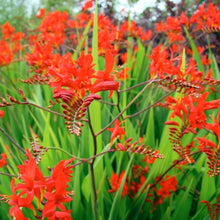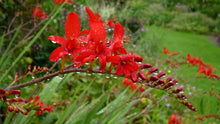Crocosmia ‘Lucifer’ is a bold perennial known for its arching stems lined with blazing red tubular flowers that bloom mid summer. Great for adding dramatic vertical interest and vivid color to borders.
Height & Spread: 2.5 - 4 ft x 1 - 2 ft
Bloom Time: Mid to late summer
Light Requirements: Full sun to part sun
Soil Preference: Well-drained, moderately fertile soil
Watering Needs: Moderate; prefers evenly moist soil, especially in dry climates
Deer Resistance: Moderate to high
NATIVE STATUS
Originates from species native to southern Africa. Despite this, it is valued in wildlife gardens for its strong appeal to pollinators and its ability to naturalize without becoming invasive in most regions.
WILDLIFE & INSECTS
Hummingbirds
-
One of the top perennials for attracting hummingbirds.
Bees
-
Exceptionally attractive to long-tongued bees, specifically loved by bumblebees.
Butterflies
-
Serves as a nectar source for larger butterflies like swallowtails, especially in late summer when food sources decline.
SPACING & LANDSCAPE USE
Spacing Recommendations
-
Plant 12 - 18 in apart to allow space for air circulation and flower arching without overcrowding.
Landscape Placement
- Ideal for mid to back borders, cutting gardens, or planted in large clumps for a bold summer display. Excellent as a vertical accent in pollinator focused designs and works well in both formal and naturalistic settings.
COMPANION PLANTS
-
Echinops ritro (Globe Thistle) - Offers contrasting texture and complementary bloom time with bold, blue flower heads.
-
Rudbeckia fulgida (Orange Coneflower) - Matches late-season bloom and draws in a wide range of pollinators.
-
Veronicastrum virginicum (Culver’s Root) - Adds upright structure and cool-toned spikes for contrast.
-
Panicum virgatum (Switchgrass) - Provides a soft, grassy backdrop that complements Crocosmia’s upright habit.
-
Salvia greggii (Autumn Sage) - Shares heat tolerance and attracts hummingbirds with long-lasting blooms.



